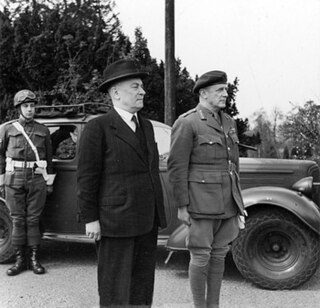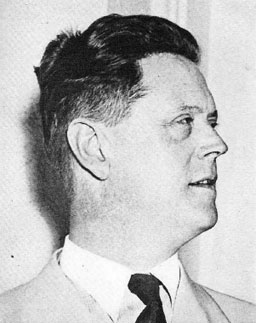Contents
| |||||
| Decades: | |||||
|---|---|---|---|---|---|
| See also: | Other events of 1939 List of years in Belgium | ||||
Events of the year 1939 in Belgium .
| |||||
| Decades: | |||||
|---|---|---|---|---|---|
| See also: | Other events of 1939 List of years in Belgium | ||||
Events of the year 1939 in Belgium .



Leopold III was King of the Belgians from 23 February 1934 until his abdication on 16 July 1951. At the outbreak of World War II, Leopold tried to maintain Belgian neutrality, but after the German invasion in May 1940, he surrendered his country, earning him much hostility, both at home and abroad.

Paul-Henri Charles Spaak was an influential Belgian Socialist politician, diplomat and statesman who thrice served as the prime minister of Belgium and later as the second secretary general of NATO. Along with Robert Schuman, Alcide De Gasperi and Konrad Adenauer, he was a leader in the formation of the institutions that evolved into the European Union.

Paul-Émile Janson was a francophone Belgian liberal politician and the prime minister from 1937 to 1938. During the German occupation, he was arrested as a political prisoner and died in a German concentration camp in 1944.

Hubert Marie Eugène Pierlot was a Belgian politician and Prime Minister of Belgium, serving between 1939 and 1945. Pierlot, a lawyer and jurist, served in World War I before entering politics in the 1920s. A member of the Catholic Party, Pierlot became Prime Minister in 1939, shortly before Belgium entered World War II. In this capacity, he headed the Belgian government in exile, first from France and later Britain, while Belgium was under German occupation. During the German invasion of Belgium in May 1940, a violent disagreement broke out between Pierlot and King Leopold III over whether the King should follow the orders of his ministers and go into exile or surrender to the German Army. Pierlot considered Leopold's subsequent surrender a breach of the Constitution and encouraged the parliament to declare Leopold unfit to reign. The confrontation provoked a lasting animosity between Pierlot and other conservatives, who supported the King's position and considered the government's exile to be cowardly.
General elections were held in Belgium on 2 April 1939. The result was a victory for the Catholic Party, which won 67 of the 202 seats in the Chamber of Representatives. Voter turnout was 93.3%.

The Belgian Government in London, also known as the Pierlot IV Government, was the government in exile of Belgium between October 1940 and September 1944 during World War II. The government was tripartite, involving ministers from the Catholic, Liberal and Labour Parties. After the invasion of Belgium by Nazi Germany in May 1940, the Belgian government, under Prime Minister Hubert Pierlot, fled first to Bordeaux in France and then to London, where it established itself as the only legitimate representation of Belgium to the Allies.

The royal question was a major political crisis in Belgium that lasted from 1945 to 1951, coming to a head between March and August 1950. The question at stake surrounded whether King Leopold III could return to the country and resume his constitutional role amid allegations that his actions during World War II had been contrary to the provisions of the Belgian Constitution. The crisis brought Belgium to the brink of a civil war. It was eventually resolved by the abdication of Leopold in favour of his son King Baudouin in 1951.

Marcel-Henri Jaspar, was a Belgian lawyer, politician, and later diplomat. He is best known for his unsuccessful attempt with Camille Huysmans and others to establish an unrecognised Belgian government in London in 1940 during World War II.

Albert De Vleeschauwer, later Baron Albert De Vleeschauwer van Braekel, was a Belgian politician of the Catholic Party.
Events in the year 1940 in Belgium
Events in the year 1944 in Belgium.
Events in the year 1945 in Belgium.
Events in the year 1895 in Belgium.

Henri Jean Charles Eugène Denis was a lieutenant general in the Belgian Army who served as Minister of National Defence at the beginning of the Second World War.
Events from the year 1949 in Belgium
Events in the year 1938 in Belgium.
Events in the year 1941 in Belgium
This is a page of the events in the year 1943 in Belgium.
The Van Acker I Government was the government coalition in the Kingdom of Belgium from 1945-1946, after the fall of Hubert Pierlot's 6th coalition government in the aftermath of the Second World War. The government, with Achille Van Acker of the Belgian Socialist Party as Prime Minister, served for four months; from the restoration of democracy until June 15, 1945. Van Acker would form another coalition, which would serve for six months until the 1946 Belgian general election.